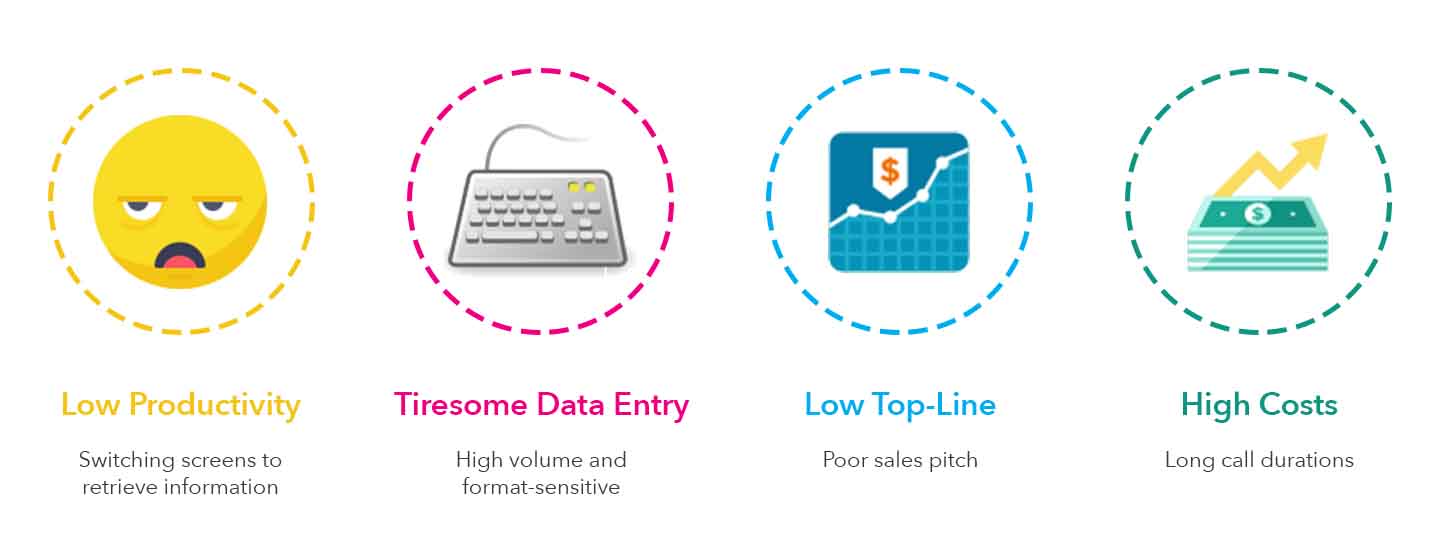A typical call center workflow comprises countless repetitive tasks that do not require intelligence or decision-making to be executed. But due to the dearth of options, businesses are forced to allocate dedicated manpower to such unfulfilling activities. A customer service representative (CSR) may answer 100s of calls daily and must address each case quickly and satisfactorily. Gathering, validating, and entering customer details to offering solutions, they have to juggle different activities for every call.
The employees managing these tasks day in, day out find them utterly tedious and demotivating. Consequently, their productivity plummets, customers receive poor service, and businesses bear high operating costs and poor revenue.
Common call center challenges

It’s the repetitive nature of call center operations that make them a great candidate for automation.
How RPA addresses these
-
Customer identification: When a call gets through to an agent, RPA bots can help them gather the basic caller information before they proceed with the case. CSRs no longer have to toggle between screens and systems to verify customer details while on the call. Bots can verify information like product details, order number, case history, etc. without human intervention. RPA automates steps such as application launch, clicks, field entries, etc. to present consolidated data in a preset format.
Benefits: Faster resolutions; focus on customer-centric services
-
Data entry: Navigation through screens doesn’t end there as CSRs have to simultaneously access different systems to enter and update the case details. This includes tasks like copy-paste, manual verification and entry, etc. which are error-prone and time-consuming. When data is entered in one system, bots can automatically copy and paste it in as many locations as needed in the preferred format. They execute tasks like auto-fills, data identification, extraction, and entry and can be programmed to handle cross-application desktop activities.
Benefits: Quick data entry; efficient process; no clerical errors
-
Offering resolutions: While resolving a case, the use of different logins, tools, and accessing and recording of information can be too much for the CSR, affecting their service quality. Many issues have the same resolution and RPA enables agents to call and share it with the caller with the click of a button. Sending emails, searching for information, doing calculations, generating invoices, regulatory compliance, etc. happen effortlessly with RPA bots. Also, calls can be routed to specialized resources based on customer profile and RPA can be integrated with chatbots to fulfill service requests. Higher cross-selling and upselling is made possible by bots based on data from customer history. They can be used to create detailed organizational reports and send them across to the intended receivers.
Benefits: Improved process outcomes; accurate resolutions
-
Case follow-ups: At times, the issue is not resolved in the first call and needs follow-ups. In the event of a repeat call, the caller has to unwantedly reiterate the case details. RPA bots grant service agents access to case details on the computer screen. Details of previous conversations are loaded from the database, eliminating the major pain-points. If required, bots can be programmed to trigger follow-up reminders for exceptional cases.
Benefits: Quick response to repeat callers, better customer engagement
-
Post-resolution tasks and reporting: Activities like case status updates can be automated using bots. Bots update the service master sheet on a daily basis with details of the cases encountered during the day. Another area where bots are immensely useful is reporting. Productivity and operations reports are generated, compiled, and shared efficiently by bots, saving precious productivity time.
Benefits: Report compilation, auto status updates
Examples of global corporations harnessing the power of RPA
AT&T
As per Steve Stine, AT&T’s chief data officer, using software robots, AI, and analytics in data optimization, the company has generated millions of dollars’ worth of business. He underscored the work of bots in scanning customer phone calls and compiling network traffic reports.
Vodafone
RPA has helped the telecommunications conglomerate to raise its purchase order processing accuracy from 73% to 85%.
Parting words: These are just a few of the major areas where smart implementation of RPA has proved to be a prudent business choice for call centers. The avenues of application for Robotic Process Automation services in call centers aren’t confined to this list as there are several others where it can help realize high gains.
RPA has numerous applications across diverse industries and can be of immense help to businesses. Are you facing any of the problems discussed here and are wondering about its fix? We have the answer! With years of rich experience in RPA implementation, we have benefitted numerous businesses across the world. If you wish to leverage the power of RPA to transform your business, contact us for an insightful conversation.

